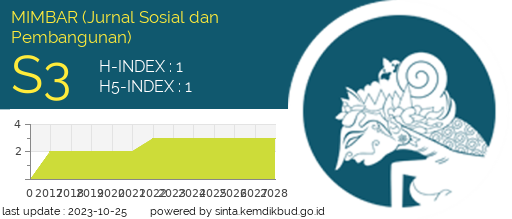IMPROVING PRIVATE HIGHER EDUCATION PERFORMANCE THROUGH PRACTICES OF KNOWLEDGE MANAGEMENT, LEARNING ORGANIZATION AND TALENT MANAGEMENT
DOI:
https://doi.org/10.29313/mimbar.v39i2.2350Keywords:
Knowledge Management, Learning Organization, Entreprenurial Mindset, Talent Management, Organizational PerformanceAbstract
The purpose of this study is to identify the organizational performance formation approach used by private universities in Jakarta's LLDikti III neighborhood. Organizational performance is the dependent variable, and knowledge management, learning organizations, talent management, and entrepreneurial mindset are the independent variables. This investigation employs a survey methodology, whereby data is derived using questionnaire-based data gathering outcomes. Lecturers at private universities in the LLDikti III Jakarta region made up the study's population. In this study, 355 respondents made up the sample. SmartPLS with SEM (Structural Equation Modeling) based on PLS (Partial Least Square) is the analysis tool utilized. The study's findings indicate that while learning organizations are unaffected by knowledge management, organizational performance.
References
Ansari, B. I., & Burhanuddin, D. (2019). PENGEMBANGAN KINERJA PERGURUAN TINGGI MELALUI MANAJEMEN BERBASIS INSTITUSI (Studi Kasus pada Perguruan Tinggi Swasta di Lingkungan LLDikti 13 Aceh). Jurnal Serambi Ilmu, 20(2).
Camilleri, M. A. (2021). Using the balanced scorecard as a performance management tool in higher education. Management in Education, 35(1), 10–21. https://doi.org/10.1177/0892020620921412
Faiqotul Ulya, S., Sukestiyarno, Y., Hendikawati, P., & Juli, D. (2018). ANALISIS PREDIKSI QUICK COUNT DENGAN METODE STRATIFIED RANDOM SAMPLING DAN ESTIMASI CONFIDENCE INTERVAL MENGGUNAKAN METODE MAKSIMUM LIKELIHOOD. http://journal.unnes.ac.id/sju/index.php/ujm
Green, D. D., Taylor III, G., & Ford, V. (2020). CULTIVATING THE ENTREPRENEURIAL MINDSET IN TODAY’S SMALL LIBERAL COLLEGES & UNIVERSITIES. GLOBAL JOURNAL OF ENTREPRENEURSHIP, 4(1), 14–26.
Gurbuz, F. G., Acar, P., & Yener, M. I. (2017). Development and validation of a talent management measurement instrument. Pressacademia, 6(3), 233–245. https://doi.org/10.17261/pressacademia.2017.683
Habtoor, A. S., Ahmad Arshad, D., & Hassan, H. (2018). Learning Organization, Strategy Adoption and Knowledge Transfer as Factors for Improving Performance of Higher Education Institutions: A Literature Review.
Hikmah Perkasa, D., & Abadi, F. (2020). under a Creative Commons Attribution (CC-BY-NC-SA) 4.0 license. JRMB) FakultasEkonomi UNIAT, 5(2), 15–28. http://jrmb.ejournal-feuniat.net/index.php/JRMB/article/view/358
Hussein, H., & Assistant, A. (2022). The Role of Talent Management in Building Learning Organizations. In Research Open Access NTU JOURNAL FOR ADMINISTRATIVE AND HUMAN SCIENCES (Vol. 2, Issue 1).
Muis, I., & Isyanto, P. (2022). Pengaruh Kepemimpinan Transformasional dan Manajemen Pengetahuan terhadap Kinerja Organisasi: Organisasi Pembelajaran sebagai Mediator. Owner, 6(1), 160–175. https://doi.org/10.33395/owner.v6i1.543
Ningrum E. Evaluation of Learning System on Teacher Educational Profession Programs. 2019;34(2):367–77. Available from: https://ejournal.unisba.ac.id/index.php/mimbar/article/view/3668/pdf
Phipps, S. T. A., & Prieto, L. C. (2012). KNOWLEDGE IS POWER? AN INQUIRY INTO KNOWLEDGE MANAGEMENT, ITS EFFECTS ON INDIVIDUAL CREATIVITY, AND THE MODERATING ROLE OF AN ENTREPRENEURIAL MINDSET . Academy of Strategic Management Journal, 11.
Rahman, Md. M., Tabash, M. I., Salamzadeh, A., Abduli, S., & Rahaman, Md. S. (2022). Sampling Techniques (Probability) for Quantitative Social Science Researchers: A Conceptual Guidelines with Examples. SEEU Review, 17(1), 42–51. https://doi.org/10.2478/seeur-2022-0023
Ramaditya, M., Maarif, M., Affandi, J., & Sukmawati, A. (2022). How Private University Navigates and Survive: Insights from Indonesia. MIMBAR : Jurnal Sosial dan Pembangunan, 0, 122-131. doi:https://doi.org/10.29313/mimbar.v0i0.8784
RamadityaM., EffendiS., & SyahraniN. A. (2023). Does Toxic Leadership, Employee Welfare, Job Insecurity, and Work Incivility Have an Impact On Employee Innovative Performance at Private Universities in LLDIKTI III Area?. Jurnal Aplikasi Bisnis Dan Manajemen (JABM), 9(3), 830. https://doi.org/10.17358/jabm.9.3.830
Ramaditya, M., Syahrul Effendi, & Dwi Fitriani. (2023). Improving work readiness through talent management, knowledge management and learning organizations in private universities. Jurnal Ekonomi Dan Bisnis, 26(2), 349–372. https://doi.org/10.24914/jeb.v26i2.8560
Ratten, V., & Ferreira, J. (2016). Global talent management and corporate entrepreneurship strategy. In International Business and Management (Vol. 32, pp. 151–165). Emerald Group Publishing Ltd. https://doi.org/10.1108/S1876-066X20160000032006
Sekaran, U., & Bougie, R. (2016). Research methods for business : a skill-building approach (7th ed.).
Suandi Simbolon, A., Padliansyah, R., & Karunia, E. (2021). Hubungan Praktik Manajemen Sumber Daya Manusia pada Kinerja Perguruan Tinggi di Kalimantan. 5(1). http://ejournal.bsi.ac.id/ejurnal/index.php/ecodemica
Sugiyono. (2022). Metode Penelitian Kuantitatif, Kualitatif dan R&D (2nd ed., Vol. 29). ALFABETA.
Syamsari Syamsari, Muhammad Ramaditya, Arianto Muditomo, Nirwan Nasrullah, & Hasbullah Hasbullah. (2023). Analysis of community participation in waste management that supports the agricultural sector in Takalar. International Journal of Research in Business and Social Science (2147- 4478), 12(3), 525–529. https://doi.org/10.20525/ijrbs.v12i3.2559
Sumardi, R., & Efendi, S. (2019). UPAYA MENINGKATKAN KINERJA DENGAN PENDEKATAN APLIKASI BALANCED SCORECARD PADA PERGURUAN TINGGI SWASTA DI JAKARTA.
Vasudevan, H. (2021). RESOURCE-BASED VIEW THEORY APPLICATION ON THE EDUCATIONAL SERVICE QUALITY. In International Journal of Engineering Applied Sciences and Technology (Vol. 6). http://www.ijeast.com
Downloads
Published
Issue
Section
License
Copyright (c) 2023 Muhammad Ramaditya, Dewi Lusiana, Rosdiana

This work is licensed under a Creative Commons Attribution-NonCommercial-ShareAlike 4.0 International License.














